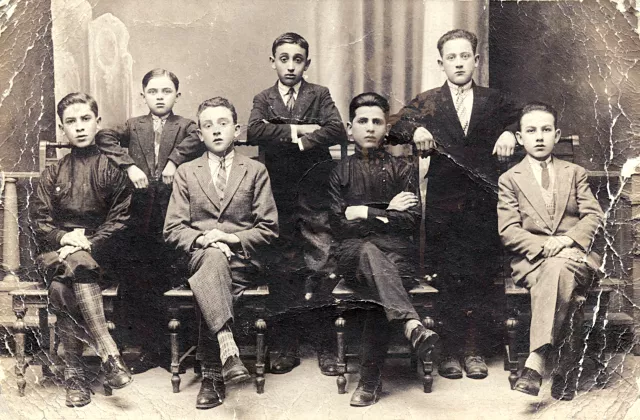This picture of me and my friends was taken around 1926 in Krasnik. From left to right: Chaim Cymerman, me, Bajrech Gutwilig, Zalmen Griner, Szlojmale Cingiser, Mendl Frajhof, Nojech Citrenbaum.
All my friends were Jewish, from the neighboring cottages. In the vicinity of our house there was a cheder, which I started attending at age five or six. Classes were in the morning. There were 30 boys minimum in my class. But I didn't like that cheder somehow. There was this melamed there, we called him Kanczuk ['kanczuk' is a whip made of leather thongs], awful discipline, and I'm belligerent, and I started fighting the discipline. In the end I got out of that cheder and moved to another one 500 meters further on. My second melamed, who had come from Lublin, was a very civilized, liberal man. But I didn't go there for long, either. It was even a progressive cheder, bBeniamin Zylberberg and his friendsut somehow I couldn't get interested in Hebrew. I found it a bit repellent, I don't know why - that was silly of me, because to this day I don't know any Hebrew. I quit cheder when I was eight or nine. In all, I was no longer than three years in both cheders.
I know Yiddish not from cheder but because we spoke Yiddish at home. When I was 16 or 17 I read an awful lot in that language. And I started to read when I was about eight or ten, with the Yiddish classics: Mendele Mokher Seforim, Sholem Aleichem, and Isaac Leib Peretz. To this day I read and have a lot of books in Yiddish at home. It was thanks to elementary school, where I started going in 1924-25, that I learned some Polish. I had a few Polish friends there, who I spoke to in Polish, but that was poor knowledge of the language too. After the outbreak of war, when I ended up in the Soviet Union, I had no one to speak Polish with at all, but I did master Russian well. I only mastered Polish after the war, at the officers' school and while studying economics. At elementary school we spoke to our Polish friends in Polish and in Yiddish. It was a kind of Polish-Yiddish, the kind used by Poles in small Jewish towns, in shtetls. We understood each other. To the end of my days I'll never forget one of my friends, by the name of Rycerz. A very decent boy. We shared a bench and we were friends. Then they put me in prison and I don't know what became of him.



























